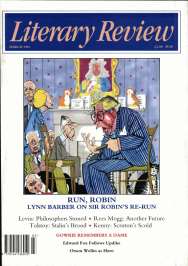Charles Shaar Murray
Carnival Spirit
American Ghosts & Old World Wonders
By Angela Carter
Chatto & Windus 224pp £13.99
Very few of us are privileged to leave this plane of existence without unfinished business – the exceptions are either appallingly well organised, or else cannot have had any real business in the first place – and this, ahem, ‘slim’ volume contains the unfinished business of one of the finest and most unorthodox British writers of the past few decades. The present collection was begun by Carter herself during the final months of her life: the structure and title are her own, and two additional pieces were subsequently added by her literary executor, Susannah Clapp. It serves to remind any of us who might have forgotten that Angela Carter spoke ‘myth’ as her native language, and with an accent unmistakably her own.
For Carter, myth subsists as a rich and loamy dream-soil which nourishes the ancient, pagan spirit of hedonism, bacchanal, carnival; that spirit which is forever thrusting its sturdy shoots through the banal concrete of Christian puritanism and contemporary rationalism. It is the earth fighting back; it is the real ‘us’. In their modern incarnations, our myths have been degraded, banalised, and bled dry of meaning by the likes of Disney and Spielberg: it was Carter’s mission, in a highly literal sense, to replace the lost blood of these myths with her own. Nowhere is this clearer than in ‘Ashputtle or The Mother’s Ghost’, a reinterpretation of Cinderella which turns it into nothing so much as a weirdly distorted mirror-image of King Lear, with Cinders (or, in this reading, ‘Ashputtle’) as a maligned Cordelia, the vicious stepmother replacing the addled King, and the same kingdom to play for. This Carterised (cauterised?) version is awash with blood: the legendary slipper overflows with it after the stepmother has mutilated the feet of her ugly daughters so that they might fit. ‘So now Ashputtle must put her foot into this hideous receptacle, this open wound, still slick and warm as it is, for nothing in any of the many texts of this tale suggests the prince washed the shoe out between fittings.’
‘Ashputtle’ is one of the Old World Wonders: it is flanked by an account of Carroll’s Alice confronting (and outwitting) the sorcerer Dr Dee and his henchman Ned Kelly in Prague, a meditation on Mary Magdalene stimulated by George De La Tour’s painting, the delightful essay ‘In Pantoland’, and ‘The Three Ships’, an account of how Christmas – in its oldest and most revelatory form as a winter solstice – returns to a Massachusetts village so grimly devout that ‘all days are holy, but none are holidays’. She performs similar alchemy in the American Ghosts section: John Ford’s ’Tis Pity She’s a Whore adapts the most celebrated work of the Jacobean playwright as the outline of a screenplay which might have been filmed by the twentieth-century oat-opera virtuoso of the same name. This punning literary trick has not been pulled off with comparable verve and aplomb since the science-fiction writer Philip José Farmer took it into his head to rewrite Edgar Rice Burroughs’s Tarzan mythos in the style of William S Burroughs, and produced a short story entitled ‘The Jungle Rot Kid on the Nod’.
The most important piece of ‘unfinished business’ included here is an extract from a planned novel exploring the life and legend of Lizzie Borden, who, allegedly, ‘took an axe/and gave her parents forty whacks’. This fragment, ‘Lizzie’s Tiger’, takes this downtrodden child to one of Carter’s favourite milieus, the circus, and inspires her with a vision of the tiger: a proud, magnificent beast straight out of Blake which sets her on the road to eventual patricide. Carter’s passion for film is also expressed in ‘The Merchant of Shadows’, which depicts a British film-freak’s Californian quest for a legendary (that word again) old director, and ‘Gun for the Devil’, a screenplay outline for a Western which could conceivably have made cowboy buffs forget about Unforgiven. Throughout, the narrative voice of Carter perpetually whispers in our mind’s ear, prodding, explaining, punning and – miraculously – never swamping the voices and personalities of her characters. It is a voice which is already sorely missed; it would be worse than remiss to pass up the opportunity to hear it again.

Sign Up to our newsletter
Receive free articles, highlights from the archive, news, details of prizes, and much more.@Lit_Review
Follow Literary Review on Twitter
Twitter Feed
The era of dollar dominance might be coming to an end. But if not the dollar, which currency will be the backbone of the global economic system?
@HowardJDavies weighs up the alternatives.
Howard Davies - Greenbacks Down, First Editions Up
Howard Davies: Greenbacks Down, First Editions Up - Our Dollar, Your Problem: An Insider’s View of Seven Turbulent...
literaryreview.co.uk
Johannes Gutenberg cut corners at every turn when putting together his bible. How, then, did his creation achieve such renown?
@JosephHone_ investigates.
Joseph Hone - Start the Presses!
Joseph Hone: Start the Presses! - Johannes Gutenberg: A Biography in Books by Eric Marshall White
literaryreview.co.uk
Convinced of her own brilliance, Gertrude Stein wished to be ‘as popular as Gilbert and Sullivan’ and laboured tirelessly to ensure that her celebrity would outlive her.
@sophieolive examines the real Stein.
Sophie Oliver - The Once & Future Genius
Sophie Oliver: The Once & Future Genius - Gertrude Stein: An Afterlife by Francesca Wade
literaryreview.co.uk